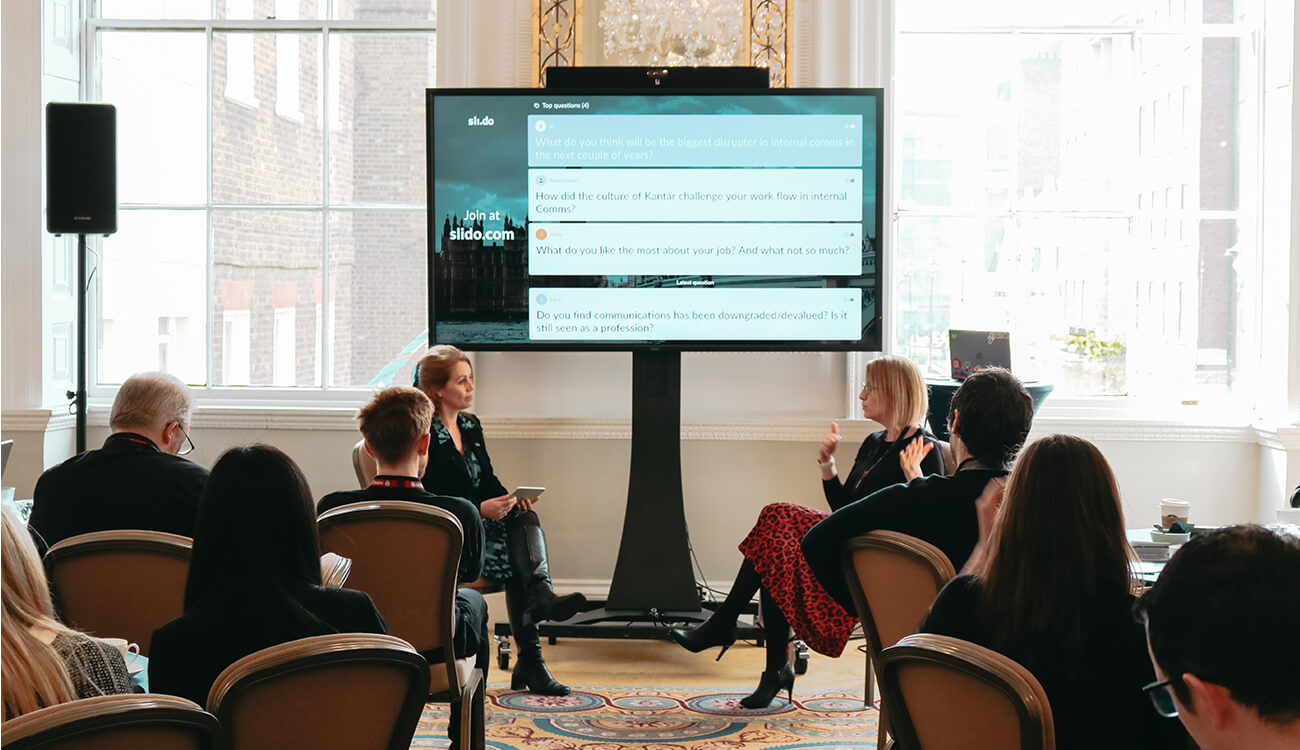When it comes to a panel discussion, everything depends on the moderator. While they’re not easy to get right, there’s an art to doing a panel event well.
For those that are moderating a panel for the first time, we’ve got all the wisdom that you’ll need to ace the job with our handy guide.
We’ve put together the essential tips that you’ll need to deliver a dynamic panel discussion, with the help of three seasoned panel moderating colleagues. These tips have been tried and tested, so make sure you try them for yourself.
1. Do thorough research on the topic
To be a really good moderator, you need to fully understand the context. So, before the panel, go in-depth and get familiar with the topic. Don’t let anything surprise you.
If applicable, review your speakers’ published pieces so that you can better relate to their arguments, or refer to their work during the panel discussion.
Besides that, it’s good to be up-to-date on what’s trending in the industry. Scouring through Twitter, or reading a couple of new blog posts from influential people, can do no harm.
2. Meet the speakers before the panel
Hop on a prep call with all the speakers (or do individual calls) a week or two in advance, to discuss the flow of the panel discussion.
Ask them about the perspective they’re planning to bring to the discussion. This will help you better understand their points and prepare more fitting questions.
As our Brand and Communications Director and experienced facilitator, Kursha Woodgate, said:
“Having some discussion beforehand helps the moderator to get some background on each of the participants and gives the conversation a more natural flow.”
If the time, or packed calendars, don’t allow for it, meet at least on the day of the panel. A last-minute sync is still better than going live for the first time on stage
3. Manage time effectively
Always start on time and finish on time. Sounds easy, but with a tight schedule and talkative panelists, this can be quite a challenge.
First, create a detailed agenda: set a realistic timeframe for your opening, introductions and your own questions, while taking into account the audience’s questions as well.
Go through the agenda with the speakers before the panel discussion starts. Tell them how much time (approximately) they have for each answer and let them know that you’re going to interrupt them if they’re running behind.
Get inspired by keynote presentations and keep the clock counter visible, so both you and the panelists know how much time you have left.
4. Start with a powerful opening
A well-rehearsed and refined intro works like a teaser for the audience, and a kick-starter for the panelists.
Our Head of Strategic Partnerships and a seasoned panel moderator, Juraj Pal, advises:
“After I greet the audience, I share with them the goals of the panel and the reason why we decided to organize it. It helps to set the stage and context for both the audience and the speakers.”
A nice way to kick off the panel is by running a warm-up poll. Here’s our list of the best icebreaker questions to help warm your audience up.
Ask the audience to cast their votes, and once you get enough input, invite the panelists to comment on the results. It’s engaging and starts up a dialogue between the speakers and the audience.

“I like asking questions such as, ‘In one word, what comes to your mind when someone says ‘company meeting‘?’. A set of associations start flowing, which gives me plenty of insight into the audience’s minds. I like to use the results to get the participants’ pulse, and as a bridge to the main topic of the panel,” says Juraj Pal.
Extra tip: Prepare short introductions for each panelist and incorporate them into your opening. Don’t let the panelists introduce themselves, to avoid long and dull biographies.
5. Be strictly neutral
Never take sides or express your own opinions. In the discussion, it’s the panelist’s job to provide and shape arguments, while yours, as a moderator, is to ensure the panel discussion flows and the audience is getting the most out of it.
“Avoid phrases such as, ‘That’s a great point’, ‘Brilliant’, or ‘Interesting’. You’re there to facilitate the conversation, not to tell the audience what you think is cool or not.
Such remarks coming from the moderator can be suggestive, and you want the audience to form their own opinions based on what they’re hearing,” noted Juraj Pal.
Instead, nod slightly, or say, “Thank you, Linda, for that”, which sounds neutral and low-key.
6. Mix in audience questions throughout the debate
Even if you have carefully prepared a set of your own questions, don’t rigidly stick to your flow.
What really makes a conversation dynamic, are the questions from the audience. After all, they are the main reason why you brought the panel together.
Use a Q&A platform to crowdsource questions from the participants in real time and incorporate the submitted questions into the panel discussion. There are two ways you can pull this off.
“The first one is inserting the incoming questions into the flow continuously.
This option is more challenging, as it requires good multi-tasking skills: You need to watch the incoming questions while listening to what the panelists are saying. However, done well, this style makes for a highly engaging and inclusive discussion.
As a second option, you can collect questions throughout and then address them in the dedicated Q&A slot.
This works well in most cases, but you risk losing the audience, who need to wait out the main discussion before you get to their questions. It’s a dilemma to crack for every panel you moderate,” shares Juraj Holub, chief meeting designer at Slido.
7. Don’t be afraid to cut the panelists off
Panelists can easily get too absorbed in the conversation and hog the microphone. If this happens, you must tactfully cut them off in order to keep the panel discussion moving.
Obviously, this can be tricky, because you don’t want to be rude or offend the speakers.
“Setting expectations is really important here. Having met the panelists before the actual debate helps them to be more forgiving if you cut them short. This also helps build a little rapport to make you more comfortable doing this, and the panelists more likely to accept it,” noted Kursha.

Follow people’s sentence pattern and interject where necessary. “Go for gentle reinforcement statements such as, ‘So what you’re saying is…’, or pass the voice over to another panelist with, ‘Thank you, Mike. Jane, I know you have some experience here too…’.
Subtle body language works magic as well. Try a hand gesture which looks like you want to contribute, or look the panelist in the eye and take a deep breath as if you want to say something,” advises Kursha.
8. Conclude the panel with a brisk question
When the time of your panel is almost up, make sure that you close the discussion meaningfully. A powerful ending is as important as a powerful opening.
Pose a final, concluding question and invite the panelists to answer it in turn.
To ensure the panel discussion doesn’t drag on for another ten minutes, ask a question that encourages brisk, to the point answers. Take inspiration from political debates, where a moderator invites participants to wrap up their arguments in a quick final statement.
Try something like: “Since we’re almost out of time, in 30 seconds, what is the main message that you would like the audience to take away?” Or, “What’s the final piece of advice you’d like to give the audience?” Remember to keep an eye on the duration of each panelist’s answer.
In a final couple of seconds, thank both the speakers and the audience for their participation.
Wrap up
While moderating a panel can be a toughie, the reward for a job well done will be an engaging, dynamic conversation that’s valuable for both the audience and the panelists themselves.
We hope you found these tips useful and that they will help you nail your first panel discussion. Good luck!




